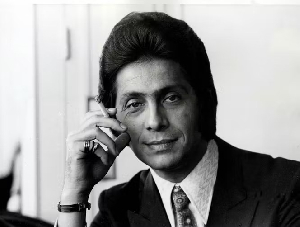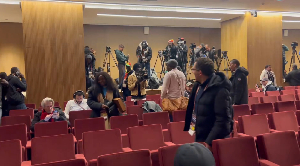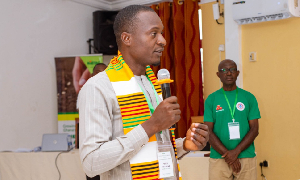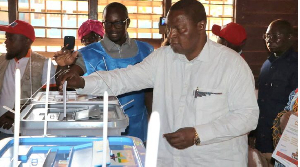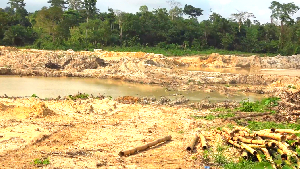THE deliberate policy of the Mills-Mahama administration of social democrats to cut down on all critical social welfare intervention programmes which they inherited in 2009 as over half a million Ghanaians fall below the poverty line in just two years has been criticised by policy think tank, Danquah Institute.
The Institute has called on Government to revise its notes and stop the unhelpful trend of deprioritising spending in critical areas such as education, health and social welfare.
“True to its 2008 manifesto promise of 'reviewing the Capitation Grant policy to reflect current economic trends and costs of education', the NDC government has slashed funding in the critical areas of Capitation Grant, School Feeding, Teacher Training/Incentives, Textbooks, and the overall administration and investment areas of the Education Sector, ensuring the nurturing of a future of hopelessness and uncertainty for 90 percent of Ghanaian Children”, a report by DI states.
Figures seen by the New Statesman expose a policy decision by the National Democratic Congress to consistently reduce, in real terms, the actual allocations of social intervention budgets targeting the poor.
For example, the budget for the Livelihood Empowerment Against Poverty has not changed since the New Patriotic Party introduced it in 2008. This has meant a reduction in real income to the beneficiaries of nearly 50% over the last 3 years. In real terms, the LEAP budget went down from GH¢12,000,000 in 2010 to GH¢11,029,412 in 2011.
The budget for the National Youth Employment Programme, also introduced by the NPP, received a mere 2.85% real increase this year, from GH¢15,000,000 to 15,427,849. This is in spite of President Mills' trumpeted intentions to create jobs for the youth in 2011, which he has dubbed his Action Year.
Also strategically worrying is the growing phenomenon of a future of hopelessness for the youth. The Mills-Mahama administration, through the Ministry of Education, has introduced, as its policy document over the next 10 years, the Education Strategic Plan 2010-2020, which, according to DI, says nothing of clarity and vision on how to promote and fund quality education and make that accessible to every child.
The main thrust of this plan, according to the report published by the Executive Director of the Danquah Institute, Asare “Gabby” Otchere-Darko, is to prioritise cost saving measures and also ensure a commitment to enhancing public financial management in the educational sector. Yet, the necessary funding to ensure management efficacy has not been allocated.
The report by the think tank notes that under the ESP, 2011 budgetary allocations for social interventions programmes in education were cut by 7.88% in real terms and 0.22% in nominal terms.
According to DI, the budget for the School Feeding programme has been cut by 8.09%, from GH¢50m to GH¢45.9m, the Capitation Grant and BECE subsidy have been slashed by 6.79%, from GH¢35.5m to GH¢33m.
The budget for what has been sold as the NDC's own initiatives has also not been spared. Free school uniforms and free textbooks have both been hit by a 24.41% decrease, from GH¢12.16m to GH¢9.19m.
This decision of Government to slash funding in key education areas, according to the DI report, is indicative of a gradual return to the situation of negligible funding witnessed under the NDC in 2000 where only 4.4% of Ghana's GDP was spent on education as opposed to the situation in 2007 where 9.1% GDP was spent on education.
“In 2010 government spent 7.93% of GDP on education and unsurprisingly this figure has reduced in 2011 to 7.57%. Under the NDC, now and before, there is a clear policy to deprioritise and reduce spending on education, at the detriment of improving the quality of education,” the report published by DI states.
The report stresses that “for Ghana to make serious strides towards development and prosperity more resources must be invested intelligently to enhance significantly the quality of education in Ghana”, regardless of the view held by Government and its development partners that Ghana spends a higher than average African percentage of its GDP on education.
“Currently, more than 60% of JHS students lack basic literacy and numeracy skills. 50% of Junior High School pupils fail in their Basic Education Certificate Examination (BECE) with 40% only passing with aggregate 30. This is the dangerous consequence of the lack of commitment to the provision of quality education”, DI points out.
According to the report, to “banish 90 percent of this country's youth to a grim future of uncertainties is an irresponsible way to build a nationand Ghana cannot continue to allow such a large majority of Ghana's future leaders to be thrown out onto the streets to face a future pregnant with uncertainties”, generated by lack of skills and lack of basic understanding of Mathematics and English.
“Unfortunately, there have been no clear policy initiatives to reverse this trend and the absence of no such policy means we are building, here in Ghana, a future of hopelessness.The lack of focus on quality education is obvious in teaching. The teacher's role in ensuring the transmission of intellectual traditions and technical skills to students is also being taken for granted by the NDC”, the think tank writes.
The report notes further, there is an unbelievable deficit of 21,000 pupil-teachers in the Ghanaian educational system at the moment. The number of teaching vacancies in 2011 was put at 33,185, with nearly 24,000 such vacancies being pupil-teachers. However, only a total of 8,625 trained teachers were earmarked for the system this academic year.
“The details of Education spending show that no budgetary allocations have been made for teacher incentives this year to improve teacher attendance, the completion of schools under trees programme, book and research allowances, the provision of infrastructure for Senior High Schools, and for the rehabilitation and upgrading of all 26 technical schools,” the report adds.
The report continues, “It is estimated that 1005 of kindergarten classrooms and 25% of both primary and junior high school classrooms are in need of major repair. Equally worrying are the growing cases of inflated cost of construction contracts for education facilities. “
The NDC government's preoccupation at the moment is geared towards the construction of new buildings at inflated prices, with some costing as high as 150% more than a similar construction two years ago, leaving existing buildings dilapidating with no funding for repairs, the ideological think tank concludes.
General News of Thursday, 19 May 2011
Source: The Statesman
Mills cuts spending on social programmes
Entertainment
